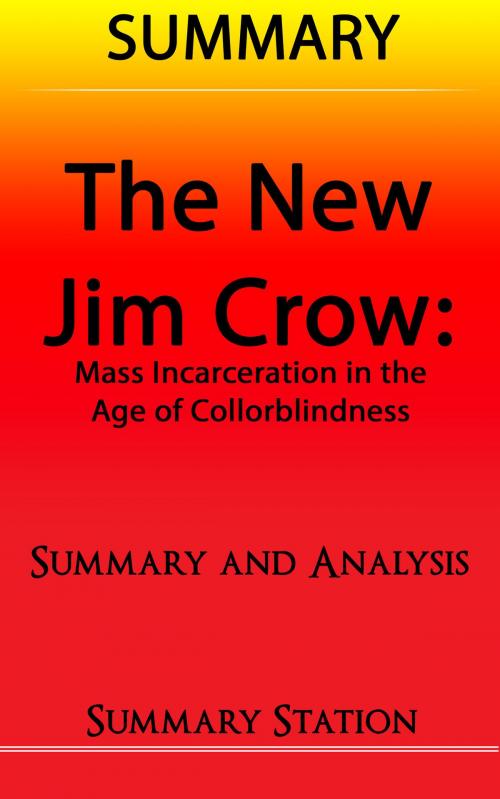The New Jim Crow: Mass Incarceration in the Age of Colorblindness | Summary
Nonfiction, Social & Cultural Studies, Political Science| Author: | Summary Station | ISBN: | 9781310463655 |
| Publisher: | Summary Station | Publication: | March 11, 2016 |
| Imprint: | Smashwords Edition | Language: | English |
| Author: | Summary Station |
| ISBN: | 9781310463655 |
| Publisher: | Summary Station |
| Publication: | March 11, 2016 |
| Imprint: | Smashwords Edition |
| Language: | English |
Michelle Alexander names three audiences whom she intends to reach and inform with her book. The first is composed of people who care profoundly about racial justice but who do not yet realize the enormous crisis of mass incarceration of people of color. The second is composed of the people who recognize a trend in the criminal justice system that resembles the racism of decades ago but who do not have the facts to back their beliefs. Last of all, she hopes to reach the many people incarcerated in the American prison system. She then uses an antidote to explain her main point, that the U.S. incarceration system continues the racial discrimination evident in our country’s history. Jarvious Cotton’s great-great grandfather was unable to vote because he was a slave. Cotton’s great grandfather was killed by the Ku Klux Klan for attempting to vote. His grandfather did not vote because of the KKK’s threats. Cotton’s father could not vote because of poll taxes and literacy tests. And, finally, Cotton cannot vote because he was once convicted as a felon. Alexander explains that voting is the most basic democratic freedom and right, yet black people throughout U.S. history have been unable to hold or else exercise that right. Furthermore, racial discrimination continues today in a legalized form because once-convicted felons are legally required to explain their background and may be legally refused service or opportunities because of it. While the reasons and rationalizations that have been used to support racial exclusion and discrimination have changed over the years, the outcome is mostly the same. In other words, in spite of the seeming advances of today, discrimination continues under the pretext of a different language; while our society likes to exemplify a “colorblind” mentality, racist ideology is implicitly carried out through the criminal justice system. Once a person is labeled a felon, employment and housing discrimination are legal, even expected; furthermore, the right to vote, educational opportunities, jury service, and food stamps as well as other forms of public benefit are revoked. The pre-Civil War and pre-Civil Rights Movement discrimination has not ended but been redesigned.
Here Is A Preview Of What You'll Learn When You Download Your Copy Today
• How Jim Crow Laws Have Evolved Through American History
• The Reason Why America Has The Highest Incarceration Rate
• Learn How The war On Drugs Was Set Up To Target Minorities
Download Your Copy Today!
Michelle Alexander names three audiences whom she intends to reach and inform with her book. The first is composed of people who care profoundly about racial justice but who do not yet realize the enormous crisis of mass incarceration of people of color. The second is composed of the people who recognize a trend in the criminal justice system that resembles the racism of decades ago but who do not have the facts to back their beliefs. Last of all, she hopes to reach the many people incarcerated in the American prison system. She then uses an antidote to explain her main point, that the U.S. incarceration system continues the racial discrimination evident in our country’s history. Jarvious Cotton’s great-great grandfather was unable to vote because he was a slave. Cotton’s great grandfather was killed by the Ku Klux Klan for attempting to vote. His grandfather did not vote because of the KKK’s threats. Cotton’s father could not vote because of poll taxes and literacy tests. And, finally, Cotton cannot vote because he was once convicted as a felon. Alexander explains that voting is the most basic democratic freedom and right, yet black people throughout U.S. history have been unable to hold or else exercise that right. Furthermore, racial discrimination continues today in a legalized form because once-convicted felons are legally required to explain their background and may be legally refused service or opportunities because of it. While the reasons and rationalizations that have been used to support racial exclusion and discrimination have changed over the years, the outcome is mostly the same. In other words, in spite of the seeming advances of today, discrimination continues under the pretext of a different language; while our society likes to exemplify a “colorblind” mentality, racist ideology is implicitly carried out through the criminal justice system. Once a person is labeled a felon, employment and housing discrimination are legal, even expected; furthermore, the right to vote, educational opportunities, jury service, and food stamps as well as other forms of public benefit are revoked. The pre-Civil War and pre-Civil Rights Movement discrimination has not ended but been redesigned.
Here Is A Preview Of What You'll Learn When You Download Your Copy Today
• How Jim Crow Laws Have Evolved Through American History
• The Reason Why America Has The Highest Incarceration Rate
• Learn How The war On Drugs Was Set Up To Target Minorities
Download Your Copy Today!















